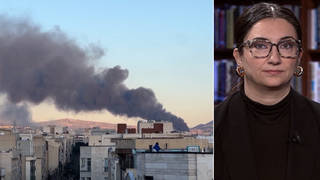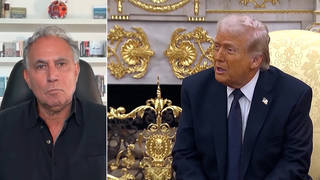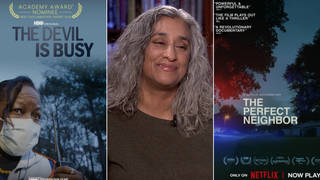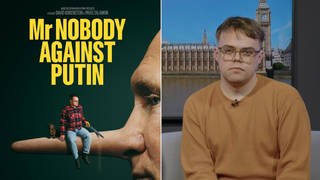
The new documentary Stripped for Parts: American Journalism on the Brink looks at how hedge funds have gutted newsrooms across the country. The hedge fund strategy of “distressed asset investing” involves buying up industries that are struggling to turn a profit, and then selling off their assets and laying off workers. “You have people who are interested solely in making money off of the newspapers and not in serving the community and doing good journalism,” says director Rick Goldsmith. “This is happening all over the country, and more than half the daily newspapers are either owned or controlled by hedge funds.”
Stripped for Parts: American Journalism on the Brink is now streaming and airing on PBS.
Transcript
AMY GOODMAN: This is Democracy Now!, democracynow.org. I’m Amy Goodman, with Juan González.
For more on the state of American journalism, we look now at a new documentary streaming and airing on PBS called Stripped for Parts: American Journalism on the Brink. The film looks at how hedge funds, like Alden Global Capital, have gutted newsrooms across the country. Alden recently made headlines when Dallas Morning News shareholders rejected its takeover bid and voted instead to be acquired by the Hearst Corporation. This is the trailer of Stripped for Parts.
RICH BOEHNE: Tomorrow will be the final edition of the Rocky Mountain News.
PENELOPE ABERNATHY: The last decade and a half, we’ve seen 1,800 newspapers disappear.
LARRY RYCKMAN: The Denver Post isn’t dying. The Denver Post is being murdered.
JOHN OLIVER: The media is a food chain which would fall apart without local newspapers.
JULIE REYNOLDS: We’ve been hearing for the last decade or so that newspapers are dying, they’re dinosaurs, because of the internet. There’s this bigger problem: There’s an industry that’s out to destroy newspapers, and doing it deliberately.
SHEELAH KOLHATKAR: Distressed investing is called vulture investing for a reason. They’re feeding on a carcass of a company. They want to get in, make some money and get out.
DAVE KRIEGER: What hedge funds will tell you is this is creative destruction in capitalism.
JULIE REYNOLDS: We got bought by this mysterious company. Nobody even knew who they were. And it was called Alden Global Capital, and it was a New York hedge fund. I said, “You’re an investigative reporter. Why don’t you dig into Alden and just write about who they are and what they’re doing, because people don’t know?”
LARRY RYCKMAN: I work for the bad guys. Now, when did that happen? When did I start working with the bad guys?
JUAN GONZÁLEZ: The Denver Post has launched a revolt against its owner, New York-based hedge fund Alden Global Capital.
JULIE REYNOLDS: A guy named Chuck Plunkett just decided he had had enough.
CHUCK PLUNKETT: It’s either stand up and speak up now, or write your own obituary in two or three years.
GREG MOORE: It’s one of the most courageous things I have ever witnessed in a 40-year career in journalism.
PENELOPE ABERNATHY: We know, from copious research, that when a community loses a newspaper, voter participation goes down, corruption goes up.
KAREN RUNDLET: There is misinformation out there. Communities are misinformed and uninformed. And that’s really dangerous.
GREG MOORE: Somebody’s got to cover the story to argue for the sanctity of facts and truth.
GARY MARX: There are times in your life when you are thrust into a situation where: Are you going to stand up and risk everything, or are you going to back down?
DAVE KRIEGER: Newspapers are not just any other business. They are the only private industry specifically named in the Bill of Rights.
JULIE REYNOLDS: History will not judge us kindly if one day we wake up to realize we failed to protect our communities’ right to know and, in turn, our very democracy.
AMY GOODMAN: And that last voice, Julie Reynolds, a key researcher on Alden Global Capital and what’s happened to newspapers in this country. That’s the trailer for Stripped for Parts: American Journalism on the Brink, streaming at pbs.org through the end of the year.
We’re joined right now by Rick Goldsmith. He is the producer and director of this documentary, that is chilling. He is in Oakland, California. He was also director of the Oscar-nominated documentary The Most Dangerous Man in America: Daniel Ellsberg and the Pentagon Papers.
Rick, this is a powerful documentary. You point out that since 2005, 2,500 newspapers have closed in this country. That’s more than 120 newspapers, on average, closing a year. Talk about what’s happening and its connection, you focus on, Alden Global Capital.
RICK GOLDSMITH: Well, I think it’s a counterpoint to what your previous story was on the national scale. This is on the local scale of journalism, with Alden Global Capital and other hedge funds having scarfed up newspapers. And what they do is they make money by selling off the assets and laying off the staff. And it’s really crippling to local communities.
And I think they — you know, they knew that in Dallas, and that’s one of the reasons why they rejected the bid by Alden Global Capital, because, you know, number one, you don’t have local ownership, and, number two, you have people who were interested solely in making money off of the newspapers and not in serving the community and doing good journalism.
JUAN GONZÁLEZ: And could you talk about the relationship, the real estate relationship of these attempts by groups like Alden Capital? For instance, Alden recently sold off the printing plant and also the offices of the New York Daily News for $90 million, while refusing to bargain with the union members there.
RICK GOLDSMITH: Exactly right. This is — it’s called distressed asset investing. That is their MO. And what that means is they buy these distressed industries — they might be in bankruptcy — for a song. That’s number one. Number two is they sell off the biggest assets, which tend to be the newsrooms, which tend to be centrally located in downtown, and the printing presses, as you mentioned. And then, number three is they cut back the staff as far as they can. And now they’ve got it three ways, cheap — you know, a cheap property and low expenses, and they can make money and keep it going for a while. But the journalism is what suffers.
AMY GOODMAN: I want to go to another clip from your documentary, Stripped for Parts, that features journalist Julie Reynolds describing her investigation of Alden Global Capital.
JULIE REYNOLDS: I really need visuals to help me understand the structure of the companies and which one owns which. It is so complex. These two guys here are the co-founders of Alden, Randall Smith and Heath Freeman here, very private individuals, especially Randall Smith. Randall Smith is many things, but he’s not a man who’s ever shown an interest in protecting journalism. The founder of Alden Global Capital is known on Wall Street as “the grandfather of vulture capitalism.” He seeks out distressed businesses and plunders them. Randall Smith is one of the early pioneers of this whole vulture hedge fund strategy. He has defined this ruthless industry.
RICK GOLDSMITH: In the 1980s, Wall Street was in the midst of a mergers and acquisitions frenzy.
GORDON GEKKO: [played by Michael Douglas] Greed is good.
RICK GOLDSMITH: Investment bankers and ambitious stock traders were looking for new ways to take advantage of the increasingly complex financing of corporate America. Many were looking to find the hot new companies, the winners. But a young, up-and-coming trader named Randall Smith wondered, “What if there was more money to be made from the losers?”
JUAN GONZÁLEZ: Rick Goldsmith, the inspiration for you to make this film, could you talk about Bill Moyers, a legendary journalist, who passed away in June at the age of 91, and his involvement in getting you to do this?
RICK GOLDSMITH: Yeah, Bill and I were talking about — I wanted to do a documentary on him, but which he wasn’t having anyone — “Who would want to see a documentary of me?” Well, I think millions, probably, would have. But we decided we’d look for another issue to do a film on. And he called me one day and had seen this article about this hedge fund scarfing up newspapers, and the journalists who were fighting back.
And I think that was the main thing for me that hooked me, because these journalists were taking it upon themselves to not only look out for their own interests, and, you know, through their guild, through their union, the News Guild, but also to educate the public about what was happening in your community with your newspapers, because everybody was noticing that the newspapers were getting thinner and thinner every month. But why was that happening? And that’s what Julie Reynolds and others were uncovering. And out of that, this film was born. And we followed it for five years.
AMY GOODMAN: Rick, Rick, we just have 30 seconds. You really focus on Denver. You focus on Baltimore Sun. You focus on Oakland, where you are. The big picture here? How desperate do you feel about the loss of local media serving a democratic society?
RICK GOLDSMITH: Well, I think there’s a plus and a minus. The minus is that this is happening all over the country, and more than half the daily newspapers are either owned or controlled by hedge funds. So, that’s the minus. The plus is that there — in every community, there are startups. There are new, innovative ways to partner with, say, public radio and local news, digital news organizations.
AMY GOODMAN: Rick, we’re going to have to leave it there.
RICK GOLDSMITH: And I feel —
AMY GOODMAN: And people can get the rest of it in this really good documentary, Stripped for Parts: American Journalism on the Brink, now airing and streaming on PBS. Check your local stations.
That does it for our show. I’ll be in Santa Fe, New Mexico, on October 17th. Check out our website, democracynow.org. I’m Amy Goodman, with Juan González.











Media Options